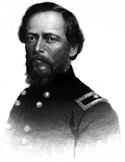(March 18th)
I occupied the rebel adjutant general’s office, which was a large, long, log house, with a good fireplace in one end of it, shingle roof, and board door. The roof leaked a good deal, but otherwise the place was very comfortable. We found it strewn with reports, letters, and returns, and picked up a good deal of information from them. When General Stoneman arrived, he had with him two of McClellan’s aides, the Count de Paris and Duke de Chartres; upon his return to camp, general French quartered the Count de Paris and General Stoneman with him, and turned over the Duke de Chartres to me, but before describing our guest I must mention my ride over the plains. Stoneman sent an orderly in advance to General French, asking him to provide a drove of beeves, for the supply of his brigade, upon their arrival in camp. The general directed me to take an orderly and ride over to the commissary station some three or four miles in the rear, and direct him to provide the cattle. It was about four o’clock, and the rain poured down in torrents, flooding the level ground so that it took on more the appearance of a sea than dry land; there being no road nor anything whatever to indicate the route, we pointed in the proper direction at starting, and wrapped in rubber coats and leggings put spurs to our horses, and dashed into the sea of mud and water at the top of our horses’ speed, and only drew rein at the hospitable tent of the commissary. Here we gave the necessary orders, fortified the inner man with copious libations of commissary, and buttoned up to the chin, headed back for the camp. It was nearly dark by this time, the wind dead ahead, and the rain coming down in perfect sheets. Nothing more melancholy or depressing than the appearance of things here can possibly be imagined. Near the commissary’s quarters were the blackened remains of the burnt rebel stores, the guant skeleton chimneys, and the vast expanse of space now overshadowed by night. We started at a full gallop, but the wind and rain beat so dreadfully in our faces our coats were torn open, the horses swerved from their course, and we lost our bearings, so we gave our horses their heads, and at 7 P.M. they carried us into camp soaked to the skin, and pretty well used up. When I dismounted and went into the office, I found most of the brigade staff officers there, and sitting in front of the fire place, his feet up on the rounds of a camp chair, a small, delicate looking man, holding in front of him the daintiest little embroidered handkerchief, making a desperate effort to dry it. The size and style of the handkerchief, the uncomfortable looking position, and general wretchedness of the man, made me laugh outright, in which the rest of the crowd immediately joined. The duke, for it was he, did not catch on at first, and looked much astonished; but finally laughed too, and it ended in a regular fit of laughter; he certainly cut a ridiculous figure, the water running down his breeches, his hair bedraggled, the very picture of despair. After a good supper, we all became hilarious and had a jolly time, in which the duke joined. When we turned in, we took the large office table, pulled it in the centre of the room, where the roof was the tightest, and giving the duke the center, as many others piled on to it as it would hold, and all were soon asleep.
The morning after the return of the cavalry, the weather cleared up and became magnificent, and the fields were soon fit for manœuvering. Nobody seemed to know what was going to happen, but from the fact that most of the army is far in rear of us, we concluded the enemy was retreating, and, it is suspected, towards Fredericksburg. General French, the second day after the storm, ordered a brigade drill with batteries, and the two squadrons of cavalry, and it proved a great and brilliant success, and was continued every day until we withdrew. We found a great deal of amusement wandering over the deserted rebel huts. Several dead bodies were found unburied, and many curious and interesting mementos. They were very comfortable here, but from the number of graves around what were the hospitals, think it must have been an unhealthy spot.
On the 18th, the brigade was ordered to fall back two miles, but the following morning advanced again to its old position. We hear the army is falling back to Alexandria, and being sent to some other part of the country, so expect shortly to retire ourselves. General McClellan seems to have been very much surprised by the enemy’s falling back from this point, and apparently has not yet determined what to do. To-day we received orders from headquarters announcing the remodeling of the organization of the Army of the Potomac. Up to this time the division has been the tactical unit, now it is to be a corps. The order is dated March 13, 1862, and divides the army into four corps; our corps is the second, and General Sumner is promoted to the command of it, and General Richardson to the division which is composed of three brigades: Brigadier-General O. O. Howard the first brigade, General Meagher the Irish brigade, and General French the third brigade. With our division are batteries B, First New York, Captain Pettit, G, First New York, Captain Frank, A, Captain Hogan, and batteries A and C, 4th United States artillery, Captain Hazzard, and Lieutenant Thomas. The present for duty in the division is said to be about eight thousand men.




